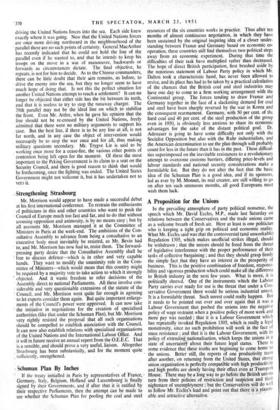A Proposition for the Unions In the prevailing atmosphere of
party political nonsense, the speech which Mr. David Eccles, M.P., made last Saturday on relations between the Conservatives and the trade unions came as a welcome breath of fresh air. Here at least is one politician who is keeping a tight grip on political and economic reality. What Mr. Eccles said was that the controversial (and unworkable) Regulation 1305, which makes unofficial strikes illegal, should be withdrawn ; that the unions should be freed from the threat of legislative interference with the proper performance of their tasks of collective bargaining ; and that they should grasp firmly the simple fact that they have an interest in the prosperity of business. This is the positive combination of freedom, responsi- bility and vigorous production which could make all the difference to British industry in the next few years. What is more, it is politically shrewd. -One of the instruments which the Labour Party carries ever ready for use is the threat that under a Con- servative Government there would be serious industrial unrest.
It is a formidable threat. Such unrest could really happen. But it needs to be pointed out over and over again that it was a Labour Government that pushed the unions into the negative policy of wage restraint when a positive policy of more work and more pay was needed ; that it is a Labour Government which has repeatedly invoked Regulation 1305, which is really a legal monstrosity, since no such prohibition will work in the face of mass resistance ; and that it is the Labour Government, with its policy of extending nationalisation, which keeps the unions in a state of uncertaint+ about their future legal status. There is some evidence that these truths are beginning to come honie to the unions. Better still, the reports of one productivity .team after another, on returning from the United States, that strong union organisation is perfectly compatible.with high productivitY and high profits are slowly having their effect even at Transport House. There may be a long way to go before the British unions turn from their policies of restriction and suspicion and their nightmare of unempldyment ; but the ConservatiVes will do well to follow Mr. Eccles's lead and point out that there is a reason- able and attractive alternative.


































 Previous page
Previous page